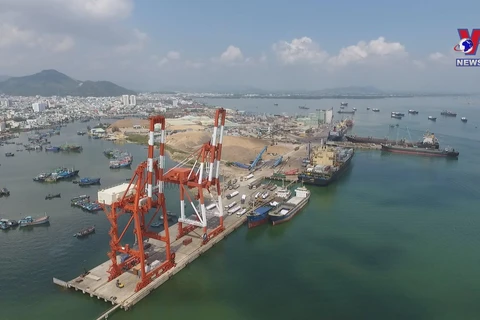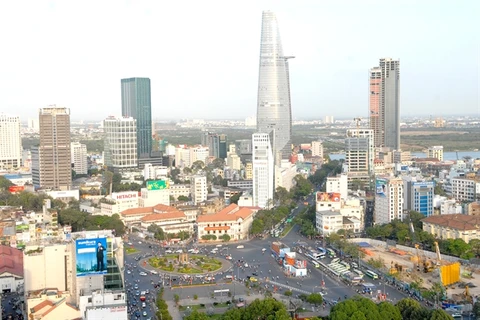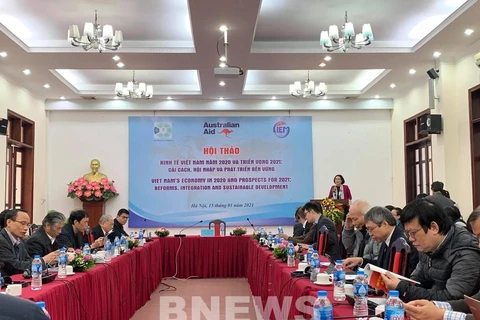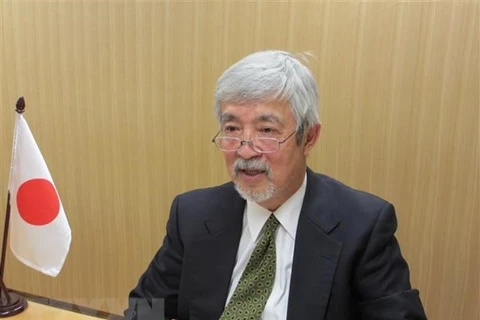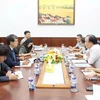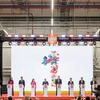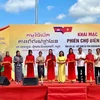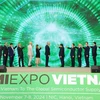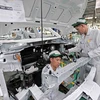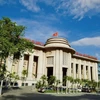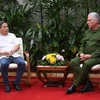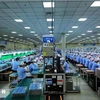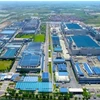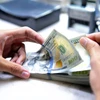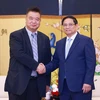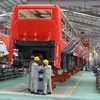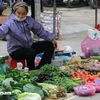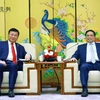Hanoi (VNA) – “Doi Moi” (Renewal) policy, launched during the sixth National Party Congress in 1986, has helped Vietnam record remarkable, comprehensive and historical achievements, with a high economic growth, people’s better living conditions and stable socio-political situation, expanded foreign relations and enhanced international prestige.
Fast economic growth
During the past 35 years, the Vietnamese economy posted impressive growth. Gross domestic products (GDP) growth in the 1991-1995 period doubled that in the 1986-1990 period to 8.2 percent annually. GDP expansion continued to be relatively high in the 2016-2019 period, at 6.8 percent.
Despite impacts of COVID-19 pandemic in 2020, Vietnam was still among the countries with highest GDP growth in the world.
The size of the economy had grown substantially to about 268.4 billion USD in 2020 from 6.3 billion USD in 1989, while the income per capita reached 2,750 per year in 2020 from 159 USD in 1985.
Thanks to the renewal efforts over the past 35 years, the country’s investment environment has been greatly improved to attract more capital.
In 2019, foreign direct investment (FDI) reached 38.02 billion USD, the highest in 10 years. In 2020, amid the COVID-19 pandemic, FDI flow to the country still hit 28.5 billion USD.
After 35 years, from a country suffering food shortage, Vietnam has risen to one of the largest farm produce exporters in the world.
Despite COVID-19 pandemic and the global economic crisis, Vietnam still earned 543.9 billion USD from export last year, up 5.1 percent over 2019. Meanwhile, trade surplus reached 19.1 billion USD, the highest in the five consecutive years since 2016.
The impressive result made Vietnam the 22th largest country in export scale and capacity and the 26th biggest in international trade scale.
Socio-economic harmony
Throughout the 35 years of renewal, economic development has maintained harmony with cultural and people development as well as social progress and equality and environment protection.
Particularly, Vietnam has shown strong performance in poverty reduction. The rate of poor households reduced remarkably through years from 58 percent in 1993 to 22 percent in 2005, 9.45 in 2010, 7 percent in 2015 and under 3 percent in 2020 in line with multidimensional poverty standards.
The education sector has recorded great achievements to meet demands in human resources. Many education indications have post a high level in the region. The rate of six years old children entering the first grade has reached 99 percent, ranking second in the ASEAN region after only Singapore, while that of students attending classes and completing the primary programme has reached 92.08 percent, becoming one of the leading among the ASEAN countries in the field.
In 2019, Vietnam ranked 68th out of the 196 countries in the world in higher education ranking, 12 positions higher over 2018. For the first time, Vietnam has four universities entering the top 1,000 universities in the world. The country has been chosen by a large number of foreign students in recent years.
At the same time, thanks to the development of the healthcare sector, people’s access to healthcare services has been much easier. Vietnam has also mastered many high-technology surgery techniques, while successfully controlling many dangerous pandemics, including the COVID-19. The country is also developing its own vaccines against the pandemic.
Meanwhile, social welfare has been ensured. In the past 25 years, 112.5 million people have enjoyed social insurance benefits.
The social security sector has coordinated with the healthcare one to provide benefits to more than 1,748 million patients, with 109 million people enjoying healthcare fee coverage each year.
Deep international integration, enhanced position
Over the past 35 years, Vietnam has integrated itself deeply into the world economy at different levels and in different forms, with the formation of strategic partnership with many partners.
So far, 71 countries have recognised Vietnam’s market economy, including many large economic partners.
Since Vietnam entered the WTO in 2007, Vietnam has signed 15 free trade agreements (FTAs) and is negotiating two others. The FTAs that Vietnam is engaging in cover almost all continents with nearly 60 economies with combined GDP accounting for nearly 90 percent of the world one, including 15 members of the G20. They have brought about great chances for Vietnam to boost economic development and enhance national competitiveness.
Vietnam is also an active and responsible member of international organisations. It has joined the ASEAN, APEC, and UN organisations such as the UN Human Rights Council in the 2014-2016 tenure, the UNESCO World Heritage Committee in the 2013-2017 tenure, and the UN Economic and Social Council (ECOSOC) in the 2016-2018 tenure.
Particularly, in 2020, Vietnam successfully performed three roles at the same time – a non-permanent member of the UN Security Council, the ASEAN Chair and the ASEAN Inter-Parliamentary Assembly (AIPA) President.
The achievements are important foundations for the country’s fast and sustainable development in the future./.




